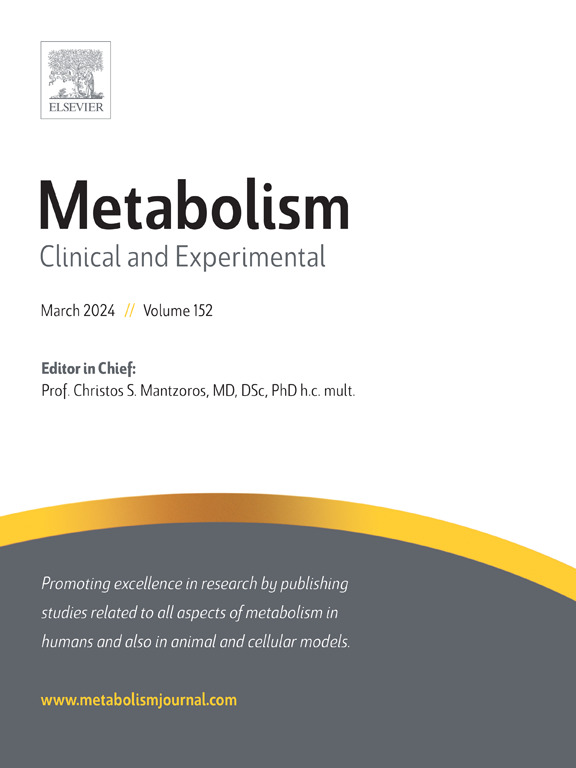久坐行为与心脏代谢健康:整合潜在的潜在分子健康方面
IF 11.9
1区 医学
Q1 ENDOCRINOLOGY & METABOLISM
引用次数: 0
摘要
在过去的几十年里,久坐行为被认为是心脏代谢健康和过早死亡的一个相互依赖的风险因素。久坐行为与慢性非传染性疾病(如肥胖、慢性呼吸系统疾病、2型糖尿病、心血管疾病和心脏代谢健康紊乱导致的癌症)的风险增加有关。然而,尽管越来越多的证据支持这些关联,但这些非传染性疾病发展的潜在分子机制在很大程度上仍然未知。因此,在这篇综述中,我们讨论了关于久坐行为引起的心脏代谢健康扰动的潜在潜在分子机制的现有证据。本文将概述与碳水化合物代谢、脂质代谢、氧化应激、炎症和微血管和宏观血管功能有关的各种潜在机制。此外,我们总结了目前关于中断久坐行为的各种策略及其对心脏代谢健康结果(包括胰岛素敏感性、血脂谱和心血管健康)的影响的证据。最后,我们强调了与潜在分子机制相关的久坐行为领域的关键研究空白。本文章由计算机程序翻译,如有差异,请以英文原文为准。

Sedentary behaviour and cardiometabolic health: Integrating the potential underlying molecular health aspects
During the last decades, sedentary behaviour has been recognised as an interdependent risk factor for cardiometabolic health and premature mortality. Prolonged sedentary behaviour is associated with increased risks for chronic non-communicable diseases (NCDs) such as obesity, chronic respiratory diseases, type 2 diabetes mellitus, cardiovascular diseases and cancer due to disturbances in cardiometabolic health. However, despite the increased evidence supporting these associations, the underlying molecular mechanisms to the development of these NCDs remain largely unknown. In this review, we therefore discuss the existing evidence with regard to the potential underlying molecular mechanisms of sedentary behaviour-induced perturbations in cardiometabolic health. Here, various potential mechanisms related to carbohydrate metabolism, lipid metabolism, oxidative stress, inflammation and micro- and macro vascular function will be outlined. In addition, we summarise the current evidence on various strategies to interrupt sedentary behaviour and their effects on cardiometabolic health outcomes, including insulin sensitivity, blood lipid profiles, and cardiovascular health. Finally, we highlight key research gaps in the field of sedentary behaviour in relation to the underlying molecular mechanisms.
求助全文
通过发布文献求助,成功后即可免费获取论文全文。
去求助
来源期刊

Metabolism: clinical and experimental
医学-内分泌学与代谢
CiteScore
18.90
自引率
3.10%
发文量
310
审稿时长
16 days
期刊介绍:
Metabolism upholds research excellence by disseminating high-quality original research, reviews, editorials, and commentaries covering all facets of human metabolism.
Consideration for publication in Metabolism extends to studies in humans, animal, and cellular models, with a particular emphasis on work demonstrating strong translational potential.
The journal addresses a range of topics, including:
- Energy Expenditure and Obesity
- Metabolic Syndrome, Prediabetes, and Diabetes
- Nutrition, Exercise, and the Environment
- Genetics and Genomics, Proteomics, and Metabolomics
- Carbohydrate, Lipid, and Protein Metabolism
- Endocrinology and Hypertension
- Mineral and Bone Metabolism
- Cardiovascular Diseases and Malignancies
- Inflammation in metabolism and immunometabolism
 求助内容:
求助内容: 应助结果提醒方式:
应助结果提醒方式:


